Trillium House Extends Temple and Monastery
Written by: Jeff Rothman and Kodo Conover
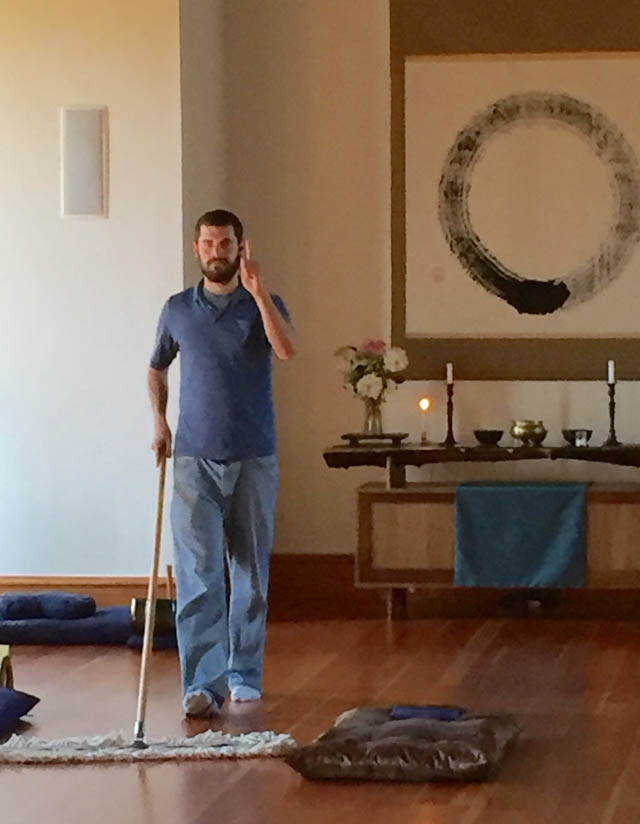
Jeff Rothman cleaning the zendo at Heart of Wisdom.
Photos by Kodo Conover,
Four Portland Zen practitioners have for the last year been deepening their practice by living together in a facility they call Trillium House.
The four are grappling with the fundamentals of community life, while being of service to the Heart of Wisdom Zen Buddhist Temple and also developing a personal work, school or career life. The temple is affiliated with the Zen Community of Oregon.
It is not an easy task, but the residents are trying to deepen their commitment to Zen Buddhist practice, while engaging in service to the wider Zen Community of Oregon sangha.
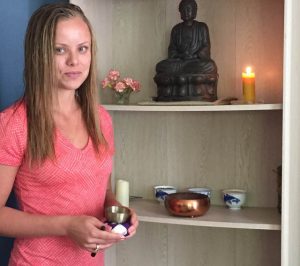
Jemma Wolcott-Green at the altar at Trillium House.
Trillium House is located in northeast Portland, just five blocks from the temple. It is a large five-bedroom structure originally built as a shelter for women and children.
Each room is spacious with a private bath. Common areas include the kitchen, living room, laundry and a small yard.
Residents agree to work together to maintain the house and yard, while developing a personal practice and a commitment to service. They also agree to abide by house rules and personal conduct guidelines.
Trillium House was first started in 2013, as a traditional Zen practice house under the direction of Zen Priest Ryushin Hart. When Hart moved on we decided to try another model, in which the house is co-created by the residents themselves, based on Zen Buddhist principles, and guided by a non-residential manager and mentors.
When Zen Community of Oregon began this project the teachers and senior students had three important questions:
Is it financially sound? Can a community living situation be financially sustainable?
Is it a benefit to the larger community and to Heart of Wisdom Zen Temple?
Is it a benefit to the residents?
After a year of experimentation by solid, involved and committed residents, we now have some preliminary answers. We are cautiously optimistic.
The cost for each room is $700 per month which includes a private bath, utilities, Wi-Fi, and laundry. By opening the guest room to paid guests, and by following energy awareness practices, we have been able to cover the costs of operating the house, including maintenance, taxes and insurance. Many volunteer hours are included in this equation, and we do not own the property.
The benefits to the community are beginning to be apparent. Each resident makes commitments to Heart of Wisdom, provides additional services there, and opens Trillium House to guest teachers and travelers. From this dedication, benefits arise.
Benefit to Residents
By Jeff Rothman
At Trillium House our overarching goal is to create conditions that are in harmony with the highest purpose of realizing and expressing enlightenment as our life.
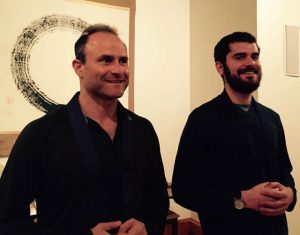
Taking the five precepts at Heart of Wisdom.
These may be sexy words, but the daily reality of life at Trillium House is basically normal.
Our formal practice schedule is centered on participation at the Heart of Wisdom Zen Buddhist Temple, where all residents attend and volunteer. We also have regular chanting and facilitated discussion at the house, and other spiritually supportive activities.
Other times we can be seen living normal lives, going to work, arguing about chores, and frequently indulging in You Tube videos, ice cream, and tortilla chips. Given this conspicuous normality, a question arises: what then is the benefit of living in an intentional spiritual community? Here are six primary benefits:
First, living with other practitioners creates what Zen Community of Oregon founder Chozen Bays calls “positive peer pressure,” to practice meditation more deeply and regularly. By their own practice, each house member silently encourages the other members to engage in formal practice activities.
After a long day at work, a juicy existential question sometimes arises: “Should I go to the temple, or watch Seinfeld re-runs?”
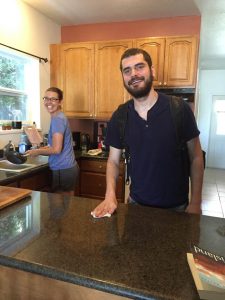
Mia Carlstrom and Rothman working in the kitchen at Trillium House.
Seeing my roommates going to temple makes it far more likely that I’ll choose the former. Residents also frequently attend five- day silent meditation retreats called sesshins at the community’s nearby monastery, encouraging others to do so as well.
The value of spiritual community is as simple as saying that we become more like the people we surround ourselves with, and are far more likely to seriously engage with spiritual practice if the people we live with are doing the same.
Second, living at Trillium helps us spiritualize the inevitable conflicts that arise when people commit to living together. Conflict is not a mistake of the universe, but is a natural part of human life. While living together, normal roommate issues arise such as how to use shared space and how to interpret house rules, as well as basic personality conflicts.
Living at Trillium doesn’t make such conflicts go away; rather, it helps us to frame conflict in a spiritual way. Instead of denying that conflict is happening or pretending it away by acting “enlightened,” we approach conflict as opportunities for personal growth.
Third, at Trillium we commit to live by the Buddhist precepts. When people commit to living the ethical precepts of Buddhism (such as not to kill and not to steal) there is a natural ripple of benefit for everyone.
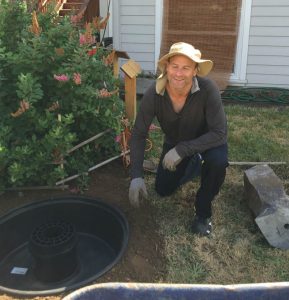
Jeff Kitay installing a new water feature at the garden of Heart of Wisdom.
Living the precepts, however, is undeniably difficult. When we sign our lease at Trillium, we not only agree to pay rent, but publicly agree to uphold the precepts. This creates an atmosphere of mutual support, and an environment that aids us in spiritual practice.
By having no drugs or alcohol in the house, and by doing our best to refrain from unwholesome behavior, we help lay the necessary groundwork for deeper work.
Fourth, we have easy access to study with teachers. The fact that the temple is just up the street allows us to have regular contact with Zen Community of Oregon teachers. The support of a teacher is a true blessing, and is a mirror for our practice.
Fifth, living in community is an end in itself because it builds meaningful relationships and fosters human connection. Days at Trillium are filled with engaging and often hilarious conversation, and simply hanging out together.
In this era with ever-increasing feelings of personal isolation, living in an intentional community is medicine that helps connect us to other people.
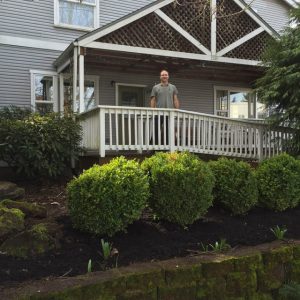
Taking a rest at Trillium House after planting new shrubs.
Last and most important, living at Trillium is a reminder to wholeheartedly engage our spiritual practice by being aware in every moment.
When we return to Trillium and see the altars, the Buddha statues, and the ethical precepts written on our wall, we are constantly reminded that each moment is a precious opportunity to be aware, to appreciate our life, and to pursue enlightened freedom. To truly wake up we need sangha to remind us to practice, and also to remind us that what we are seeking has never once been separate from us.
As Trillium House unfolds, it is beginning to reflect the vision embedded in Zen Community of Oregon: “A hearth, an offering and a bridge.”
The hearth is a welcoming place or home, an offering is the continuous offering of the dharma through personal practice and service, a bridge is the connection between Great Vow Zen Monastery, Heart of Wisdom and the larger community.
Trillium House is truly becoming an extension of Zen Community of Oregon’s temple and monastery. Keep an eye on this project steeped in dharma and intention, to see how it continues to unfold and to benefit in many unexpected ways.
Trillium House is a project affiliated with Zen Community of Oregon, which includes Great Vow Zen Monastery and Heart of Wisdom Zen Temple. Co-abbots are Chozen Bays Roshi and Hogen Bays Roshi. Great Vow is located in Clatskanie, Oregon, and Heart of Wisdom is located in northeast Portland.
